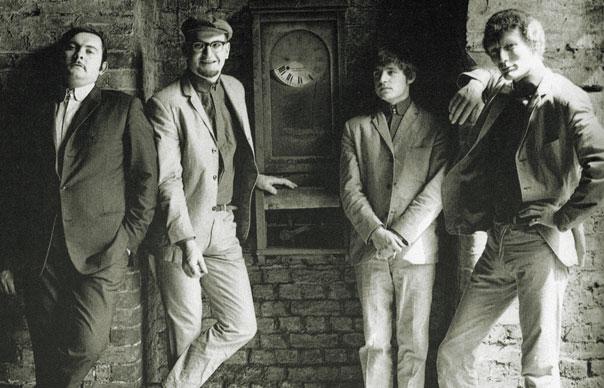A wizard, a true star... Graham Bond is usually remembered for his magical interests and his untimely death, an apparent suicide in 1974. The band he founded, the formidable Graham Bond Organisation - whose output between 1963 and 1967 is celebrated here - is better known for Bond’s more illustrious sidemen, notably Ginger Baker and Jack Bruce. A year after the pair left to form Cream in summer 1966, replacement drummer Jon Hiseman and trusty tenor saxman Dick Heckstall Smith also quit, joining rival bandleader John Mayall before themselves founding Colosseum. Yet it’s the GBO’s electrifying recordings that should be remembered, a thrilling, unique brand of British R&B, driven by Bond’s supercharged Hammond organ. In 1961 Bond was well established as an alto sax player (with Don Rendell), before he switched allegiance from Charlie Parker to Ray Charles. Briefly joining Alexis Korner, Bond poached Bruce and Baker from Blues Incorporated to create the first GBO in 1963, adding budding guitarist John McLaughlin. McLaughlin’s rapid departure and Heckstall Smith’s arrival established the definitive GBO line up adopting a daring jazz rock approach that was truly liberating. Bond’s intense, wholehearted playing influenced Brian Auger, Zoot Money, Jon Lord and Keith Emerson, among many. Bond was an innovator, playing the Hammond through a Leslie Cabinet (pre-Mike Ratledge/Soft Machine) and pioneering the mellotron on record, road-testing the cumbersome instrument long before it became a fashionable prog accessory. An intimidating, unruly looking bunch, the GBO had no obvious frontman or focal guitarist. Commercial success eluded them, to the point of bafflingly covering Debbie Reynolds’ ‘Tammy’, but The GBO did record the two exceptional albums The Sound of ‘65 and There’s A Bond Between Us. These underpin this collection, elevated by such delights as Duffy Power’s rousing Parlophone singles (with the GBO) and unheard sessions with Jamaican guitarist Ernest Ranglin. There’s little from the final trio with Dick Heckstall Smith and Hiseman but that’s a contractual quibble (interested parties should check out Solid Bond). Deserted again by musicians he had nurtured, suffering depression and battling drug abuse, Bond uprooted to America for a couple of years, returning to oversee various ungainly bands (Holy Magick, Incantation, Magus) that drew on a preoccupation with white magic. Bond re-united with Ginger Baker in the unwieldy Airforce, worked with Pete Brown (who provides this box-set’s affectionate notes) and recorded two albums that clumsily tried to marry chants and incantations with free jazz. At his best, though, powering the original GBO, Bond was a true catalyst for future ideas, still sounding dazzlingly fresh and modern today. Mick Houghton
A wizard, a true star…
Graham Bond is usually remembered for his magical interests and his untimely death, an apparent suicide in 1974. The band he founded, the formidable Graham Bond Organisation – whose output between 1963 and 1967 is celebrated here – is better known for Bond’s more illustrious sidemen, notably Ginger Baker and Jack Bruce. A year after the pair left to form Cream in summer 1966, replacement drummer Jon Hiseman and trusty tenor saxman Dick Heckstall Smith also quit, joining rival bandleader John Mayall before themselves founding Colosseum.
Yet it’s the GBO’s electrifying recordings that should be remembered, a thrilling, unique brand of British R&B, driven by Bond’s supercharged Hammond organ. In 1961 Bond was well established as an alto sax player (with Don Rendell), before he switched allegiance from Charlie Parker to Ray Charles. Briefly joining Alexis Korner, Bond poached Bruce and Baker from Blues Incorporated to create the first GBO in 1963, adding budding guitarist John McLaughlin. McLaughlin’s rapid departure and Heckstall Smith’s arrival established the definitive GBO line up adopting a daring jazz rock approach that was truly liberating.
Bond’s intense, wholehearted playing influenced Brian Auger, Zoot Money, Jon Lord and Keith Emerson, among many. Bond was an innovator, playing the Hammond through a Leslie Cabinet (pre-Mike Ratledge/Soft Machine) and pioneering the mellotron on record, road-testing the cumbersome instrument long before it became a fashionable prog accessory. An intimidating, unruly looking bunch, the GBO had no obvious frontman or focal guitarist. Commercial success eluded them, to the point of bafflingly covering Debbie Reynolds’ ‘Tammy’, but The GBO did record the two exceptional albums The Sound of ‘65 and There’s A Bond Between Us.
These underpin this collection, elevated by such delights as Duffy Power’s rousing Parlophone singles (with the GBO) and unheard sessions with Jamaican guitarist Ernest Ranglin. There’s little from the final trio with Dick Heckstall Smith and Hiseman but that’s a contractual quibble (interested parties should check out Solid Bond). Deserted again by musicians he had nurtured, suffering depression and battling drug abuse, Bond uprooted to America for a couple of years, returning to oversee various ungainly bands (Holy Magick, Incantation, Magus) that drew on a preoccupation with white magic.
Bond re-united with Ginger Baker in the unwieldy Airforce, worked with Pete Brown (who provides this box-set’s affectionate notes) and recorded two albums that clumsily tried to marry chants and incantations with free jazz. At his best, though, powering the original GBO, Bond was a true catalyst for future ideas, still sounding dazzlingly fresh and modern today.
Mick Houghton



